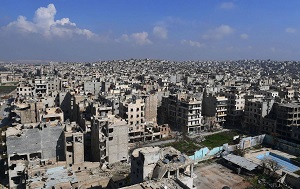Why are Egyptians bringing their own coffee to coffee shops?

Sonia Farid, Al Arabiya
“Legal drugs” is what coffee is called in Egypt and that explains why the slightest drop in its quality can affect the mood of all coffeehouse regulars who cannot get through the day without a few cups. Many mistakenly associate street cafes across Cairo with the retired and the unemployed and maybe that was the case decades ago, but now Cairenes of all age groups –including students and professionals, certainly no longer males only—frequent those cafes on daily basis in search for their caffeine fix.
Addicts, however, have started complaining of a gradual decline in the quality of their coffee and which coincided with the devaluation of the pound and the subsequent rise in coffee prices. Some have even taken to bringing their own coffee with them to the coffee shop.
Following the devaluation of the pound in November 2016, prices of all imported goods rose remarkably. Some goods were replaced by their local more affordable equivalents, yet this could not be applied to coffee, 100% of which is imported. “Coffee prices rose by 50% after the devaluation in addition to a global increase of 500 USD per ton of green coffee,” said Hassan Fawzi, head of the Coffee Division at the Cairo Chamber of Commerce. Fawzi added that Egyptians consume 38,000 tons of coffee annually, which translates into 133 million USD. “Consumption did not drop in Egypt after the price hike.” According to Fawzi, the most expensive is Yemeni coffee, sold for 230 Egyptian pounds per kilogram, followed by Colombian coffee, LE 120, and Turkish coffee, LE 60-80. “A cup of coffee served to the consumer is usually a blend of different types and this determines its prices. For example, the more Yemeni coffee it has, the more expensive.”
Back in 2014, it was possible for coffeehouses to buy a kilogram of good coffee, mostly Brazilian or Indonesian, from local roasters for less than LE 50 and while Yemeni coffee was always expensive it was available in some places. But now that prices have doubled, Yemeni coffee became totally out of the question and as for other types, owners of coffeehouses were left with two options: raising the price per cup or mixing coffee with other ingredients. Many went for the latter. It is, however, impossible to fool coffee experts. Customers started noticing that the coffee has no foam on top, which is usually a sign of good quality coffee, then in a few seconds its color changes until it looks more like murky water as the coffee precipitates at the bottom of the cup. There is also a powdery after taste that one does not experience with good coffee. According to coffeehouse regulars, the level of cheating varies from one neighborhood to another and depends on how much you pay for a cup. Many of those who cannot do away with the tradition of sipping on their cup of coffee in their favorite coffeehouse started bringing their own coffee to make sure they get the quality they seek.
Coffee cheats
Journalist Hussein Qassem quotes Mahmoud Ismail, the owner of a coffee roaster in Fatimid Cairo as saying that cheating is done at the coffeehouse. “Roasters will never risk their reputations and add anything to their coffee, so this is done by owners of coffeehouse,” said Ismail. “It is easy to do that with dark roast since adding anything else will not show and it needs no technology at all.” Khaled Salama, owner of a roaster in downtown Cairo, explained that cheating is done through adding specific ingredients such as peanuts, brown sugar, date drupes, lupine, wheat, or rice. “Coffeehouse owners would buy 300 grams of medium quality coffee then add another 300 grams of the other ingredients while making sure the color is as close as possible to coffee so it won’t be noticed by customers.”
Coffeehouses are subject to inspection by a number of bodies including municipal councils and the Ministry of Health, the latter presumably in charge of the quality of commodities offered to customers through the National Institute of Occupational Safety and Health. Yet according to several coffeehouse owners, such inspections can never detect if the coffee is not pure since they only focus on checking paperwork and sometimes the general cleanliness of the place. “In case of violations, things are usually settled through money,” said one coffeehouse owner who spoke on condition of anonymity. “In fact, many ministry employees get monthly salaries from coffee shop owners to turn a blind eye to violations, but the quality of served coffee is never an issue in all cases.”
While some coffee experts insist that it is now hard to find a single street café in Cairo that offers pure coffee, others argue that this is not the case with cafes in middle class neighborhoods whose clientele are too picky to settle for cheated coffee and who pay more, whether for coffee and in tips, hence would not compromise on quality. The remarkable increase in the number of regulars who insisted on bringing their own coffee was alarming for many café owners, who decided against risking their reputation. In many of those cafes, customers only bring their coffee if it is not available there such as types with chocolate and nuts or oriental blends mixed with cardamom, nutmeg, or saffron. Some coffeehouses offer the latter, also known as “flavored” or “spiced” coffee.
Despite price hikes, coffee consumption keeps increasing and imports are expected to grow by 10-15% in 2018. Egypt imports 70% of its coffee from Indonesia and the remaining 30% from several countries, mainly Kenya, Brazil, and India.
Latest News
-
 Cabinet suspends mandatory retirement rules, approves funding measures
Cabinet suspends mandatory retirement rules, approves funding measures
-
 Lebanon state media says 3 killed in Israeli strike on vehicle near Sidon
Lebanon state media says 3 killed in Israeli strike on vehicle near Sidon
-
 Syria State Media Says Kurdish Force Shelling Kills One Person in Aleppo City
Syria State Media Says Kurdish Force Shelling Kills One Person in Aleppo City
-
 Crown Prince chairs meeting to review programme on combating littering
Crown Prince chairs meeting to review programme on combating littering
-
 King congratulates Morocco monarch on football team’s 2025 Arab Cup win
King congratulates Morocco monarch on football team’s 2025 Arab Cup win